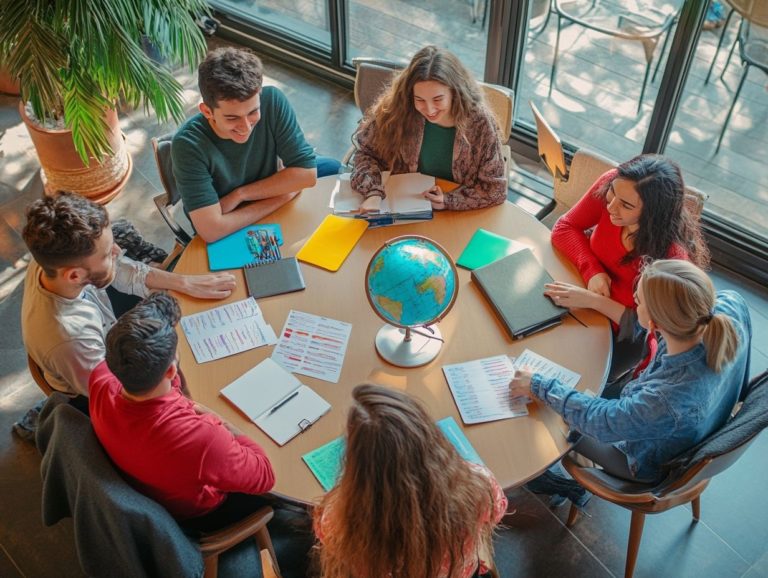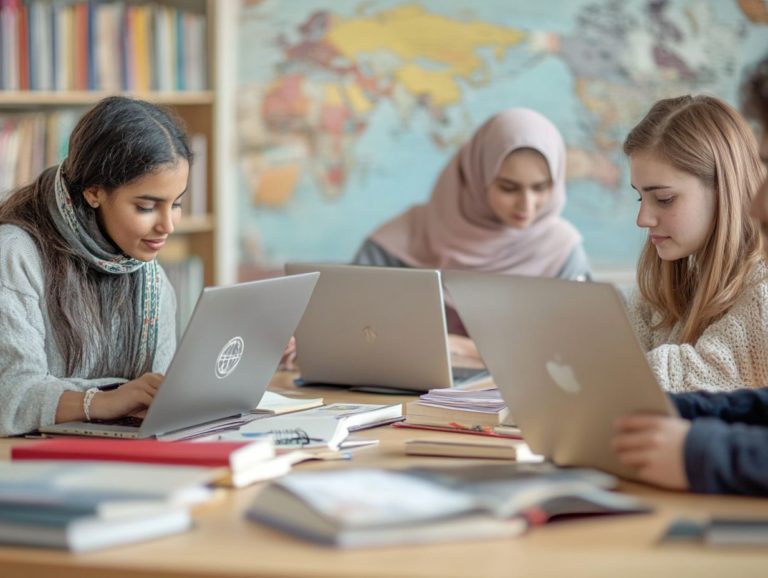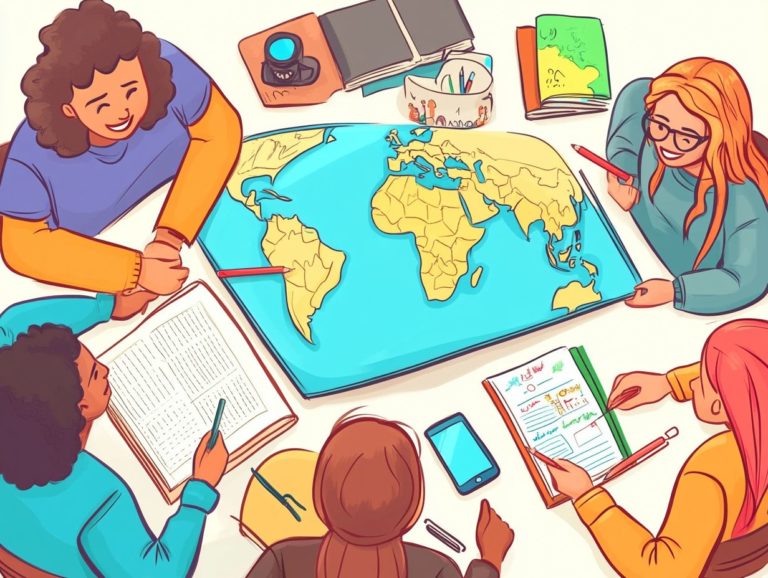10 Essential Phrases for International Students
Navigating a new academic environment can be quite the challenge, especially for international students. Language barriers, cultural differences, and the pressure of keeping up with coursework can transform your experience into a daunting endeavor. Keep reading to discover how to make the most of your study abroad adventure right now!
To bolster your confidence, we’ve curated ten essential phrases that will facilitate communication with professors and peers. Whether you’re seeking clarification or asking for assistance with assignments, these phrases will support your academic success and help you forge meaningful connections in your new surroundings.
Contents
- Key Takeaways:
- 1. “Can you repeat that, please?”
- 2. “How do you say this in [language]?”
- 3. “I need help with [subject/assignment].”
- 4. “What is the deadline for this assignment?”
- 5. “Can I have an extension on this assignment?”
- 6. “I have a question about the class syllabus.”
- 7. “Can I schedule a meeting with my professor?”
- 8. “I am having trouble understanding this concept.”
- 9. “Can you recommend any study resources?”
- 10. “I am interested in joining a study group.”
- What Are the Common Challenges Faced by International Students?
- Frequently Asked Questions
Key Takeaways:
1. “Can you repeat that, please?”
In the realm of travel, mastering basic phrases like “Can you repeat that, please?” is essential for effective communication, especially in foreign environments where English might not be the primary language.
This phrase acts as a lifeline in various travel scenarios whether you re ordering food at a bustling market, seeking directions on a crowded street, or trying to understand public transport announcements in an unfamiliar city. Imagine mishearing a crucial instruction while boarding a train; politely asking for clarification could save you from a potential mishap.
To elevate your language skills, practice this phrase in different foreign languages by weaving it into your daily conversations or utilizing language learning apps. Engaging with locals or fellow travelers can create real-life situations where asking for repetition is necessary, reinforcing your understanding and use of the phrase while enhancing your overall travel experience.
2. “How do you say this in [language]?”
Asking “How do you say this in [language]?” is an essential phrase that will serve you well as you find your way through new destinations. It not only aids in learning the local language but also fosters cultural exchange and sharpens your language skills throughout your journey.
This simple inquiry acts as a bridge to deeper connections and mutual understanding, allowing you to engage more authentically with locals. For example, while exploring a bustling market, you might ask how to order a traditional dish in the native tongue, opening the door to rich dialogue with the vendor.
Such interactions can spark friendships and create unforgettable memories. To seize these opportunities fully, consider utilizing dual-language dictionaries or enrolling in language courses. These tools will help you build confidence and competence in the language, ultimately enhancing your travel experience and making each moment more meaningful.
3. “I need help with [subject/assignment].”
As an international student, you may often find yourself needing to communicate the phrase “I need help with [subject/assignment]” to seek assistance from peers or professors, particularly in a new cultural and academic environment.
This phrase acts as a vital lifeline, allowing you to bridge language barriers and find your way through the academic landscape more effectively. Familiarizing yourself with variations of this expression can boost your confidence when approaching others for support. Practicing these dialogues in social settings or through role-playing exercises can be incredibly beneficial.
Challenges are part of the journey; different educational systems may have varying expectations regarding student interaction, and it s natural to feel intimidated or unsure about when or how to ask for help. Understanding these dynamics is essential for creating a more productive and supportive learning experience.
Start using these phrases today to build confidence and connect with your new community!
4. “What is the deadline for this assignment?”
Understanding deadlines is crucial as you navigate foreign educational institutions. When you ask, What is the deadline for this assignment? you re not just meeting academic expectations; you re also adapting to new cultural norms that may differ from what you re used to.
Mastering deadlines is also important for academic success. Using planners or digital calendars is beneficial for tracking assignments and important dates. This helps you stay organized and focused.
Maintaining regular communication with your professors, especially when using a second language, enhances your understanding and reduces misunderstandings. Phrasing your questions courteously and seeking clarification shows your initiative and helps build a positive rapport with your educators.
Recognizing the varying importance of deadlines across different educational cultures allows you to prioritize your responsibilities effectively and align your efforts with institutional standards.
5. “Can I have an extension on this assignment?”
Asking, “Can I have an extension on this assignment?” can greatly influence your success as a student. It showcases your initiative and highlights the significance of polite interactions in a foreign academic environment.
The nuances of requesting extensions are especially important as you navigate educational expectations. Different cultures interpret such requests differently; for instance, some regions prefer directness, while others appreciate a more subtle approach. Understanding these differences enhances the effectiveness of your request.
To increase the likelihood of a favorable response, frame your requests with genuine appreciation for understanding and flexibility. A simple, “I appreciate your consideration of my situation,” can go a long way. Additionally, mastering key phrases in the local language shows respect and effort, further reinforcing positive communication.
6. “I have a question about the class syllabus.”
Asking, “I have a question about the class syllabus,” is essential to clarify your academic responsibilities and navigate foreign educational settings confidently.
This question shows your commitment to understanding course expectations and serves as a vital bridge to engaging in your studies. Getting familiar with the syllabus can be crucial for various scenarios, from identifying assignment deadlines and grading rubrics (criteria used to assess assignments) to understanding class policies on attendance and participation.
Clear communication about your questions fosters a supportive learning environment. This approach helps you adapt more seamlessly to new academic norms and expectations, alleviating anxiety and laying a solid foundation for your academic success in an unfamiliar landscape.
7. “Can I schedule a meeting with my professor?”
The phrase “Can I schedule a meeting with my professor?” puts you in control of your educational journey, paving the way for meaningful conversations that enhance your understanding and break down communication barriers.
This straightforward question opens the door to invaluable mentorship, academic guidance, and personalized feedback. In settings where hierarchy is significant, especially in some Asian cultures, using respectful language and gestures enhances the interaction. For example, you might say, “Excuse me, Professor, could we arrange a time to meet?” In more casual contexts, a relaxed approach like, “Hey, can we chat sometime this week?” might work better.
To bridge cultural gaps, practice this phrase in different languages. Try it in Spanish: ” Puedo programar una reuni n con mi profesor?” or in Mandarin: ” “ Doing so demonstrates respect and shows your commitment to understanding diverse cultural norms.
8. “I am having trouble understanding this concept.”
Expressing “I am having trouble understanding this concept” is important for overcoming language barriers. This ensures you receive the support necessary for your academic success.
By candidly acknowledging your struggles, you enable educators to pinpoint specific areas where you might need guidance, whether it’s vocabulary comprehension or sentence structure. You may feel overwhelmed by technical jargon in a science class, making it difficult to keep up.
Communicating these challenges helps teachers tailor their support to your needs and creates a team spirit in class.
To further enhance your comprehension, consider employing strategies such as:
- Summarizing information in your own words
- Utilizing visual aids
- Engaging in peer discussions
These strategies can solidify your understanding and boost your confidence in using the new language.
9. “Can you recommend any study resources?”
Asking, “Can you recommend any study resources?” not only elevates your learning experience but also opens doors to connections with peers who can provide invaluable guidance throughout your study abroad journey.
These questions can lead to valuable conversations, allowing you to uncover lesser-known platforms like academic forums, library archives, and digital repositories that are brimming with study materials specifically tailored to your field.
Joining local study groups or getting involved in online communities can further enhance your access to a diverse range of resources. Being proficient in the local language is essential here, as it gives you the power to navigate these networks effectively and secure personalized recommendations.
This cultural immersion not only supports your academic success but also enriches your entire experience in a new educational environment.
10. “I am interested in joining a study group.”
Joining a study group is a fantastic way to connect and learn from others! It opens up a world of opportunities for you to engage with peers while fostering cultural exchange.
These groups offer a safe space for learning, where you can practice new languages, learn idiomatic expressions (phrases that don’t mean exactly what the words say), and grasp cultural nuances that textbooks often overlook.
For example, in a Spanish study group, you and your fellow members might share local customs or discuss current events, deepening your conversations beyond mere vocabulary.
When you express this interest, consider using basic phrases in the target language, such as “Me gustar a unirme a un grupo de estudio,” to spark a more connected dialogue. By actively seeking out these connections, you not only enhance your linguistic skills but also cultivate friendships that transcend cultural barriers, making your educational journey more fulfilling and enjoyable.
What Are the Common Challenges Faced by International Students?
International students face a multitude of challenges, including language barriers, cultural adaptation, and the complexities of new academic systems. Each of these factors can profoundly influence both their travel experience and academic success.
These hurdles can foster feelings of isolation and uncertainty as you strive to navigate unfamiliar environments. Understanding local customs can be a fun challenge, often resulting in unintentional social blunders.
Additionally, the differing educational expectations may leave you feeling overwhelmed; the nuances of classroom participation and assessment methods can vary significantly from what you’re used to. Building meaningful connections in this new landscape can also feel daunting, making it tough to forge friendships.
Many resources are available such as mentorship programs, cultural associations, and workshops to help you conquer these challenges and thrive in your academic endeavors. Don’t let these challenges hold you back! Embrace the resources available to help you succeed.
How Can International Students Overcome Language Barriers?
Overcoming language barriers is crucial for international students who want to thrive in their new environment. Practical steps include engaging in language practice, seeking assistance from peers, and enrolling in language courses to sharpen your communication skills.
Participating in language exchange programs offers even greater benefits. Conversing with native speakers creates a supportive environment for mutual learning. Consider using dual-language dictionaries; they help build your vocabulary and enhance your comprehension.
Immerse yourself in local cultural events for a rich, hands-on experience that promotes real-world language application. Embrace these strategies to boost your confidence and improve communication, ensuring a more rewarding educational journey abroad.
What Are the Best Ways to Make Friends with Local Students?
Making friends with local students can transform your travel adventure into something unforgettable! Use strategies like participating in social events, joining clubs, and engaging in thoughtful interactions to nurture mutual understanding and friendships.
These connections expand your worldview and open doors to real cultural interactions. Local students have invaluable insights into their region’s customs, traditions, and social norms, which help you navigate your new surroundings.
To meet these students, attend university open days, cultural fairs, or local workshops where collaboration and networking thrive. Embracing local customs like greeting rituals and dining etiquette can help break down barriers and forge deeper connections.
These relationships will enrich your travel journey, leading to shared experiences and treasured memories. Start connecting today and experience the difference!
How Can International Students Adapt to a New Culture?
Cultural adaptation is vital for international students. It requires openness to learning about local customs, participating in community events, and forging connections with peers to facilitate a smoother transition.
To thrive in your new environment, seek opportunities to engage with the local culture whether it s joining clubs, attending workshops, or volunteering. Understanding communication styles is essential; some cultures prefer direct interactions, while others appreciate subtlety and non-verbal cues.
Immerse yourself in traditional festivities to enrich your experience and foster meaningful connections with locals. This provides a deeper understanding of the social fabric. Embrace these experiences to enhance your cultural competence, which means understanding and interacting well with people from different backgrounds.
What Are the Benefits of Studying Abroad?
Studying abroad opens up a world of benefits, from enhancing your language skills to immersing yourself in rich cultural exchanges. You’ll develop a global network of friends and professional connections.
But it s not just about tangible perks. This experience fosters profound personal growth, pushing you to step beyond your comfort zone and cultivate adaptability. It enhances your career prospects by offering unique perspectives that are highly coveted in the global job market, and it gives you the power to build cultural competencies essential for thriving in today s diverse workplaces.
As you explore new environments, you will gain invaluable insights, leading to meaningful connections and transformative experiences. This journey invites you to reflect on your ability to create lasting impacts, both personally and professionally, in an increasingly interconnected world.
How Can International Students Take Care of Their Mental Health?
Taking care of your mental health is crucial as you navigate the complexities of studying abroad. The pressures of cultural adaptation, homesickness, and academic challenges can feel overwhelming at times.
You ll be glad to know that support is readily available to you. Many universities offer mental health support, peer support groups, and workshops specifically designed for international students like you.
Utilizing these resources can significantly help you address feelings of isolation and anxiety. Incorporating regular physical activity, maintaining a balanced diet, and nurturing social connections can serve as effective coping strategies.
Don t hesitate to reach out to friends, family, or mental health professionals; this can play a vital role in managing stress. Seeking help is a sign of strength, not weakness. Embracing this mindset can empower you to build resilience and adapt more effectively to your new environment.
Frequently Asked Questions
What are the 10 essential phrases for international students?
- “Hello”
- “Thank you”
- “Excuse me”
- “I don’t understand”
- “Please repeat”
- “How do you say?”
- “Can you help me?”
- “I need help”
- “Where is…?”
- “How much is…?”
Why are these phrases important for international students?
These phrases are important because they help international students communicate effectively and navigate their new environment with confidence. They are also a sign of respect and can help build relationships with others.
How can I practice using these phrases?
You can practice using these phrases by speaking with native speakers, watching videos or movies in the language, and using them in everyday situations, such as ordering food or asking for directions.
What if I don’t know how to pronounce a phrase?
If you don’t know how to pronounce a phrase, you can ask a native speaker to help you, listen to audio recordings, or use online resources that provide pronunciation guides.
Are these phrases the same in every language?
No, these phrases may have different translations or variations in different languages. It’s important to research and learn the specific phrases for the language you are studying.
Can I use these phrases in formal settings?
Yes, these phrases can be used in formal settings as they are considered polite and respectful. However, it’s important to also learn formal phrases and greetings specific to the culture you are in.
To further improve your mental health, consider reaching out to local resources or hotlines specifically geared towards international students. Taking that first step can make a significant difference in your experience.





